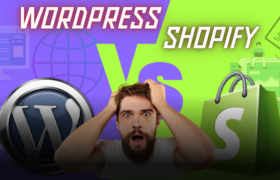Introduction:
The e-commerce industry is a constantly shifting environment where companies attempt to establish online platforms that successfully draw in and maintain customers. WordPress and Shopify are two of the biggest names in the e-commerce industry. In this research, we’ll look at e-commerce websites that are profitable and run on both types of platforms in more detail to learn how each helps them succeed.
Table of Contents
WordPress Customer Success Stories:
WordPress, known for its flexibility, has proved to be a reliable platform for a wide range of e-commerce operations. Here were a few important examples of success:

WooCommerce Thinks:
WooCommerce, a WordPress e-commerce plugin, has helped many online retailers grow. The flexibility of WooCommerce has allowed enterprises of all sizes, including large international brands and local shops like “Nature’s Best Market” and “Allison’s Art Haven,” to create unique, engaging shopping experiences.
Content-Commerce The process of fusion:
Websites such as ‘MVMT’ successfully combine commerce and content through using WordPress’s robust content management system. These companies, such as “Beardbrand” and “Kettle & Fire,” have successfully combined e-commerce with captivating material through engaging narrative and an intuitive design.
Shopify Customer Success Stories:
A customized e-commerce platform called Shopify has made it feasible for many companies to create successful e-commerce websites. Here are a few instances of successful businesses:
Directly to consumers (DTC) Prevails:
Shopify’s user-friendly interface and wide e-commerce capabilities have allowed brands like “Allbirds” and “Fashion Nova” to develop successful DTC companies. Because to Shopify’s reliable facilities these companies place a high priority on a seamless shopping experience.
Specialized Markets & Unique Products:
Two Shopify e-commerce success stories that target specific markets with unique products are “Bulletproof” and “Huel.” These companies have been able to achieve success in the markets they operate in because to Shopify’s flexibility and customized features.
Why Choose Shopify vs. WordPress:
| Feature | Shopify | WordPress (with WooCommerce) |
|---|---|---|
| Ease of Use | less customizable in terms of design than WordPress | Highly adaptable; code and design are adjustable |
| E-commerce Functionality | Built for e-commerce; robust features | requires plugins for full e-commerce functionality, such as WooCommerce. |
| Customization | Limited compared to WordPress; uses themes | Highly customizable; vast range of themes and plugins |
| Themes and Templates | Premium themes available; mobile-responsive | Abundance of free and premium themes; mobile-responsive designs |
| Flexibility | Less flexible than WordPress in terms of design | Highly flexible; customizable code and design |
| SEO Capabilities | Good SEO features; easy to optimize | Excellent SEO capabilities; can be further enhanced with plugins |
| Security | hosted on servers owned by Shopify; regular updates | Active leadership is required; security plugins are provided |
| Cost | Monthly subscription fees, transaction fees | Open-source and possibly cheaper, WordPress required extra charges for hosting and premium plugins/themes. |
| Community Support | Strong community support; official help center | Massive community support; extensive documentation |
| Scalability | Outstanding flexibility; suitable for big-box stores. | scalable, with the proper hosting, able to manage big websites |
| Content Management | e-commerce-focused, less flexible for websites with a lot of content | Initially created for managing content, this flexible design may be used on a variety of websites. |
10 Things Shopify Can Do:

- Connection of Payment Gateways: Shopify offers support for a number of payment gateways, allowing you to take payments through debit cards, credit cards, and other methods.
- Inventory management: You can maintain an eye on the amount of stock, efficiently handle your product inventory, and receive low-stock warnings.
- Customization: Shopify allows you customize the appearance and feel of your shop on the internet with an extensive selection of themes and customization tools.
- App business: The Shopify App Store offers an extensive range of plugins and apps to increase the usability of your business, ranging from customer support advancements to promotion tools.
- Features for SEO: Shopify has integrated SEO tools that will assist you improve your store for search engines and increase its ranking in search results.
- Empty Cart Recovery: To convince customers to complete their purchases, you can set up a computerized email reminder system to track them.
- Discounts & Promotions: Shopify gives you the capacity to make promo codes, discounts, and exclusive deals that bring in and keep customers.
- Shopify offers: extensive analytics and reporting tools to monitor sales, customer behavior, and other important indicators, assisting you with making sound business choices.
10 Things WordPress Can Do vs

- Content Management: WordPress is recognized for its capacity to manage content, and this makes it simple to create and arrange various types of material, such as media, pages, and blog posts.
- Versatility: WordPress isn’t restricted to e-commerce, in comparison to Shopify. It may be used to develop a wide range of websites, include business websites, forums, and portfolios.
- Open Source: While WordPress is a program that is freely available, users are able to alter and customise the platform in order to suit their specific needs.
- Many Theme Options: WordPress has a large choice of themes that fit a variety of professions and stylistic preferences. It’s simple to modify themes to fit the style and feel of your website.
- Plugin Ecosystem: WordPress boasts a robust plugin ecosystem which improves its functionality. Users might incorporate functions such as
- SEO Flexibility: Users may optimize their websites for search engines with WordPress’ excellent SEO features, that can be enhanced further with SEO plugins.
- WordPress gives you the ability to manage roles for users, create subscription sites, and limit access to different parts of your website.
- Community and Support: There is a large and dynamic WordPress user, creator, and contribution community. Support is offered by an abundance of discussion boards, tutorials, and documentation.
- Customization with Coding: WordPress offers an elevated level of customization to users that have coding skills by enabling users to customize themes and features.
- Self-Hosting: WordPress gives you greater control over the security and functionality of your website by allowing you choose the hosting provider you use.
Why Merchants Prefer Shopify to WordPress
Selecting the best platform for your company’s website is a must in the constantly shifting environment of online commerce. WordPress and Shopify are both well-liked options that are regularly featured. Despite the reality that Shopify has specific e-commerce performance, many merchants prefer it over WordPress because of its adaptability. We’ll explore the reasons why a growing number of retailers choose Shopify over WordPress in this blog post.
Built for E-commerce Excellence:
Shopify is an entire software set designed particularly for meeting the requirements of online businesses. It was developed with e-commerce in view. Shopify is ready to go out of the box, but WordPress, that requires plugins for advanced e-commerce features.
User-Friendly Interface:
Shopify’s user-friendly interface is a major factor in merchants’ appreciation for it. Shopify offers a simplified online store creation process that is user-friendly for both beginner and experienced business owners. Easy navigation and a user-friendly interface make the process very simple.
Easy Payment Integration:
Shopify easily interacts with a wide range of payment gateways, which makes it easy for businesses to take payments. Credit cards, digital wallets, and other payment methods are just a few of the simple services that Shopify offers to both customers and sellers.
Dedicated Customer help:
Shopify offers professional customer help for e-commerce problems. The ability to swiftly handle refers to and guarantee effortless business operations is highly valued by merchants.
Scalability for Growth:
Scaling is important as organizations grow. The structure of Shopify is built to efficiently oversee the growing number of online retailers. Shopify adjusts easily to the shifting requirements of your company, from managing a small number of merchandise to overseeing a large inventory.
Security First Strategy:
Any online steadfast ought to put a high importance on security. Because Shopify is a hosted service, security is taken care of continuously. Automatic improvements, secure payment processing, and ongoing safety precautions are all beneficial to merchants.
Mobile Optimization:
Having an online store that is optimized for mobile devices is of the utmost importance given the increasing popularity of using mobile devices. Shopify makes sure that the website of your business is not only responsive but also gives users of mobile devices such as tablets and smartphones the greatest possible buying experience.
Easily Manageable:
Shopify’s full platform makes managing your web-based business easier. Merchants may efficiently handle every facet of their company within the framework of Shopify, from inventory management and order fulfillment to marketing and analytics.
App Store for Extra Functionality:
Though Shopify has an array of impressive built-in abilities its App Store allows retailers to add additional operations. The App Store offers an enormous number of alternates, be it for analytics, advertising tools, or integrations with other services.
Continuous Platform Improvements:
Shopify improvements its platform regularly to keep its customers ahead of the competition consumer expectations and behaviors. Without necessitating regular improvements, merchants may take benefit of new characteristics, greater security, and improved performance.
Conclusion:
In conclusion, the success stories of Shopify and WordPress-powered e-commerce websites highlight the wide range of benefits each platform offers. Because to WordPress’s flexibility, businesses are able to seamlessly combine content and commerce, creating unique and captivating buying experiences. On the contrary, Shopify, with its special focus on e-commerce, offers advantages to companies that value an easy and effective e-commerce process. The primary takeaway is to recognize the distinctive needs of your company, because both platforms have shown to be beneficial collaborators in the search for e-commerce success. Whether you prefer Shopify’s e-commerce features or WordPress’s flexibility, there are plenty of alternatives for companies to succeed and create out a place in the world of technology.
- Apple iPhone 16 Review: Price, Features, and New Changes
- Marketing Funnel Works: Strategies for Success and How to Optimize
- ChatGPT Announced: ChatGPT-5’s Arrival – Pricing, Features & Exclusive Insights
- iPhone 16 Series: Powering Up with a Battery Boost Above iPhone 15
- AI Features in iOS 18: Exploring the AI and All That’s New












Leave a Reply